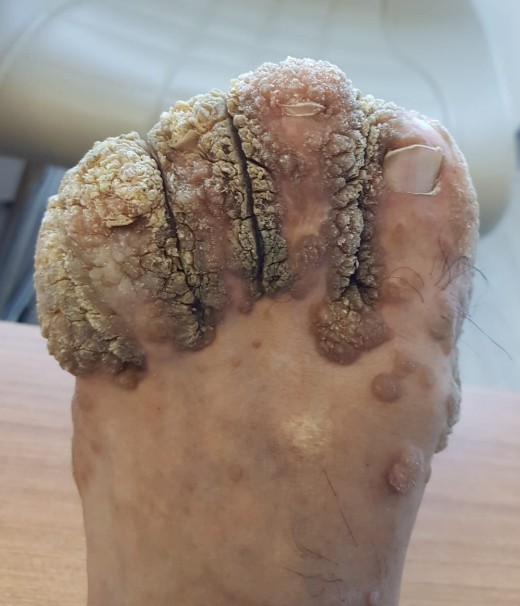Warts are a contagious disease caused by the virus known as HPV, and they can occur on all parts of the body’s covering layer. They can only spread from person to person, with direct contact being the most common transmission route.
Do Warts Spread?
Yes, warts can spread by scratching or through personal items, transferring from one part of the body to another and becoming very widespread. In individuals who mistake them for blemishes or moles and delay treatment, warts can spread all over the body.
As warts become more widespread, their treatment becomes increasingly difficult.
Warts can be successfully treated with procedures such as radio frequency, laser, and cauterization, but these methods are applicable for treating a small number of warts. When there are hundreds of warts, using these methods becomes very expensive and cumbersome.
For very widespread warts, the most practical treatment is to use Venerex Ointment. It can be successfully treated by applying it twice a day.

What Are the Types of Warts?
While the same virus affects all types, their forms are different. There are more than 230 types of HPV. The names of diseases caused by HPV (human papillomavirus) vary according to the affected region and countries.
They are referred to by names such as wart, condyloma, and condyloma acuminata.
The following names are used based on the region:
- Verruca vulgaris: Hands, face, body areas
- Verruca plantaris: Soles of the feet
- Condyloma acuminata: Anus, penis, and vagina
Similarly, different names are given to warts in different regions.
The virus seen on the body can sometimes spread so extensively that it covers the entire body.
How Do Warts Spread?
The only way they spread is through contact. While some say this must be direct contact, scientific studies show that they can also spread through shared items. For warts in the anal and genital areas, the first thought is sexual intercourse, but items like toilet seats and bidet faucets can also facilitate transmission.
Warts on the body, face, hands, and arms can spread through handshakes, clothing, or through tools used by hairdressers like combs. They can also spread through manicure, pedicure, or laser devices if these tools are not sterilized after being used on an infected person.
How Can Wart Formation Be Prevented?
There is no way to prevent it other than protection. To protect yourself, pay attention to hygiene, but the risk of transmission remains. Avoid direct contact with individuals who have warts, do not share personal items, ensure that hairdressing tools are clean, and verify that nail care tools used by podiatrists are sterilized. For services like hair removal, ensure that the point where the device touches your skin is cleaned with an antiviral (virus-killing) solution.
If there are suspicious individuals around, ask them to wash their hands frequently, and wash your hands after contact with them.
Does Everyone Who Contracts the Virus Develop Warts?
No, not everyone who contracts the virus will develop the disease. There are many factors involved in transmission.
A person’s immune strength plays a role; individuals with weak immune systems or those with suppressed immunity (such as organ transplant recipients) are more likely to develop the disease and experience rapid spread. The type of virus contracted also matters; more risky types cause the disease more frequently. The virulence (disease-causing ability) of the virus is also important.
Wart Treatment
When warts are not numerous, they can be treated with radio frequency (1), electrocoagulation (2), laser, or cryotherapy (3). Among these, radio frequency is the most successful, and cryotherapy is the least successful. For warts that are too widespread to be treated with these methods, the most effective solution is Venerex Ointment.
Using solutions containing burning acids is extremely risky as they can cause deep burns and excessive scarring.
What Does Venerex Ointment Contain?
Aside from fillers, its active ingredient is 15% catechin (sinecatechin) (4) (5).
How Does Venerex Ointment Work?
- It is derived from green tea extract.
- Stimulates immunity.
- Prevents cell division.
- Has antiviral effects.
Side Effects of Venerex Ointment
An allergy can develop to the active ingredient and excipients. If an allergy occurs, usage should be discontinued.
It can cause irritation in the mouth, anus, and vagina. If the irritation is bothersome, the application should be reduced and stopped if necessary. Normally, it is recommended to be used twice a day, but in case of irritation, it can be used once a day.
Can Breastfeeding Mothers and Pregnant Women Use Venerex Ointment?
Yes, there is no harm in using it during the breastfeeding period. However, no scientific studies have been conducted regarding its use during pregnancy, so it is advisable to consult a doctor. Preferably, safer methods can be chosen (6).
Where to Buy Venerex ?
It can be obtained from all pharmacies in Turkey. You can also purchase it from our official website, Defnil Pharma, and from our official sales channels on online marketplaces for safe use.
For the current price of Venerex Ointment, you can find updated information on our official sales page at defnilpharma.com.
Scientific Sources
1- Gupta, P. J. (2004). Radio surgery: a new tool in proctology practice. Bratislavske lekarske listy, 105(7/8), 270-276.
2- Çetinkaya, K., & Dervişoğlu, H. 2013 VE 2014 YILLARINDA ANKARA ONKOLOJİ HASTANESİ GENİTAL KONDİLOM SIKLIĞI VE TEDAVİ YÖNTEMLERİ. Türk Jinekolojik Onkoloji Dergisi, 18(1), 11-14.
3- Bostancı, Ü. (1996). Verrukalarda kriyoterapi uygulaması.
4- Tyring, S. K. (2012). Effect of sinecatechins on HPV-activated cell growth and induction of apoptosis. The Journal of clinical and aesthetic dermatology, 5(2), 34.
5- Tyring, S. K. (2012). Sinecatechins: effects on HPV-induced enzymes involved in inflammatory mediator generation. The Journal of Clinical and Aesthetic Dermatology, 5(1), 19.
6- Sinha, S., Relhan, V., & Garg, V. K. (2015). Immunomodulators in warts: Unexplored or ineffective?. Indian journal of dermatology, 60(2), 118.
